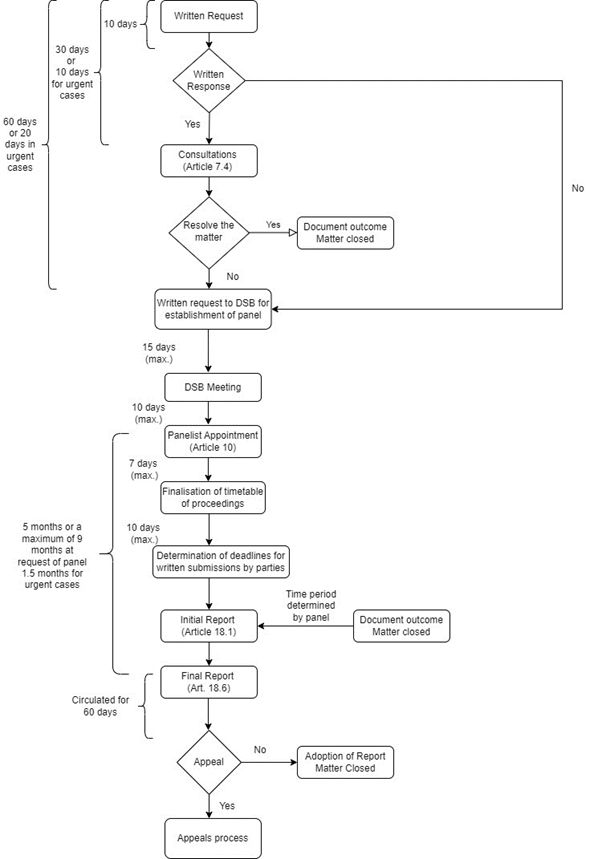- within Criminal Law topic(s)
- with readers working within the Banking & Credit industries
This article is the third of a series analysing the African Continental Free Trade Area (AfCFTA) and its implications for the Mauritian business community. This third article explores the Protocol on Rules and Procedures on the Settlement of Disputes, focusing on the consultations and panel process for dispute settlement under the Protocol. An upcoming article (Part 4) will analyse the appeals process through the Appellate Body as well as arbitration.
As highlighted in Part 11, the AfCFTA is a landmark trade agreement, constituting the largest free trade area in the world in terms of the number of participating countries. The Agreement, which brings together 54 African countries and eight regional economic blocs, represents a combined population of 1.3 billion and total GDP estimated at USD 3.4 trillion. The AfCFTA aims to eliminate tariffs and non-tariff barriers on almost all trade in goods and services.
Dispute settlement is essential for ensuring that any conflict which arise in the implementation of the AfCFTA can be transparently and predictably settled. Article 20 of the AfCFTA provides for the establishment of an AfCFTA dispute settlement mechanism administered through the Protocol on Rules and Procedures on the Settlement of Disputes (hereafter referred to as the Dispute Settlement Protocol). The Dispute Settlement Protocol applies to disputes arising between Member States with regard to their rights and obligations under the provisions of the AfCFTA and specifically establishes of the Dispute Settlement Body (DSB).
The DSB, composed of representatives from Member States and a chairperson elected by Member States, will establish rules of procedures as required and meet as often as necessary. In particular, the DSB will be responsible for:
- Establishing Dispute Settlement Panels (Panel) and an Appellate Body (AB);
- Adopting Panel and Appellate Body Experts;
- Maintaining surveillance of implementation of rulings and recommendations of the Panels and Appellate Body;
- Authorising the suspension of concessions and other obligations under the AfCFTA.
It is important to note that only Member States (i.e. governments) can have recourse to the dispute settlement process, similar to the approach used by the World Trade Organisation (WTO). Complaints from the private sector would, therefore, have to be registered through the relevant government trade office who would then initiate a dispute through the DSB. The dispute settlement process under the Protocol is explained below.
In the event of a dispute between Member States, the Protocol provides for resolution through consultations in the first instance. Article 7 of the Protocol stipulates the rules for the amicable resolution of disputes through consultations. Requests for consultations should be notified to the DSB through the AfCFTA Secretariat in writing, providing the reasons for the request and including the identification of the issue(s) and an indication of the legal basis for the complaint. The Member State to which the request must respond within ten days of its receipt unless agreed otherwise by both parties and must enter into consultations in good faith within 30 days after the date of receipt of the request. A period of 60 days is provided for the settlement of the dispute through consultations. If the concerned party does not respond or enter into consultations within the required delay, the Member State initiating the request may refer the matter to the DSB and request for the establishment of a Panel. Consultations are confidential and without prejudice to the rights of any Member State in any further proceedings. In urgent cases, including cases involving perishable goods, the Member State to which the request has been made, has the obligation to enter into consultations within ten days of receipt of the request and a shorter period of 20 days is provided for settlement of the dispute through consultations.
If no amicable solution is found through consultations, any Member State involved in the dispute may refer the matter to the DSB in writing and request for the establishment of a Panel. The request to the DSB should include the following details: whether consultations were held, identification of specific measures related to the dispute and a summary of the legal basis of the complaint. The DSB has to convene a meeting within 15 days of the request to establish a Panel and the Panel has to be constituted within 10 days of the meeting of the DSB.
The AfCFTA Secretariat maintains an indicative list or roster of individuals that can serve as Panellists. Member States may annually nominate two individuals to the Secretariat for inclusion in the list. Panellists are required to have expertise or experience in law, international trade, other matters covered by the Agreement or the resolution of disputes arising under international trade agreements. Panellists must be impartial and must comply with a code of conduct developed by the DSB and adopted by the Council of Ministers.
When a dispute arises between two Member States, the Panel comprises three members. When there are more than two disputing Member States, the Panel consists of five members. To preserve impartiality and independence of Panellists, nationals of the disputing Member States are not allowed to serve on a Panel regarding that dispute, unless the Member States agree otherwise. The nominations for the Panel are proposed to the disputing Member States by the Secretariat. If no agreement is reached on the composition of the panel within 30 days after the date of the establishment of the Panel, the Head of the Secretariat, in consultation with the Chairperson of the DSB and with the consent of the disputing Member States, will appoint the Panellists. A Panel should be composed within 10 days of the receipt of the request by the DSB.
Once the panel is appointed, it has to consult widely and regularly with the disputing Member States and provide them with the opportunity to develop a mutually satisfactory solution. The Panel has to make an objective assessment of the facts of the case including an assessment of the applicability of and conformity with the relevant provisions of the Agreement and should provide the DSB with its findings to assist the latter in making recommendations and rulings. The Panel process should also take into account the interests of Third Parties to a dispute. The Third Party should notify its substantial interests to the Panel through the DSB and if the disputing parties agree that the claim of substantial interest is well-founded, the Third Party will have the opportunity to ge heard and to make written submissions to the Panel.
In the event that there are multiple complaints related to the same matter, a single Panel can be established taking into account the rights of all State Parties concerned. The single Panel has to organise its examination and present its findings in such a way that the rights of the complainants are not impaired. The Panel should also submit separate reports if requested by one of the complainants. If multiple Panels are established to examine complaints related to the same issue, the same Panellists should be appointed to the different Panels to the extent possible and the timelines for the panel processes in these disputes should be coordinated.
Following the composition of the panel and the determination of its terms of reference, Panellists have up to 7 days to finalise the timetable for the proceedings of the Panel and 10 working days, upon the expiry of the seven days, to determine precise deadlines for written submissions by parties to the dispute. Panellists have a maximum of 5 months from the date of establishment of the Panel to issue the final report. In cases of urgency, including perishable goods, the final report should be issued within 1.5 months of establishment of the Panel. If a Panel determines that it is not feasible to adhere to the above-mentioned timelines, it should inform the DSB in writing, stating the reasons for the delay and providing a timeline for issuance of the final report. A maximum period of 9 months from the date of the composition of the Panel is allowed for issuance of the final report in such cases.
At the request of both parties to a dispute, the work of the Panel can be suspended at any time for a period not exceeding 12 months and agreed by the parties to the dispute. The Panel can only resume its work at the end of the agreed period at the request of the Complaining Party. If the Complaining Party does not make such a request before the expiry of the suspension period, the procedure is terminated.
The Panel can seek information and technical advice from any source that it deems appropriate after having informed the disputing Member States. Such sources can include Member States except those involved in the dispute. For technical and scientific issues, the Panel can also have recourse to an advisory report in writing from an expert review group with relevant qualifications and experience on the issue. Deliberations of the Panel are confidential and disputing Member States are required to treat as confidential any information submitted to the Panel. However, the Protocol does not prevent a Member State from disclosing statements of its own positions to the public.
Following the deliberations, the Panel issues a draft report, which contains the facts and arguments of the dispute, to the disputing Member States for comments. Comments must be submitted within a period set by the Panel and are taken into account in the interim report. Disputing Member States may submit a written request to review specific aspects of the interim report prior to the issuance of the final report. The final report should include the arguments made at the interim review stage.
Within 60 days of the circulation of the final report to the State Parties, the DSB shall consider, adopt, and sign the report at a meeting convened for that purpose, unless a Party to the dispute formally notifies the DSB of its decision to appeal or the DSB decides by consensus not to adopt the report. The Parties to the dispute shall receive a signed copy of the adopted report within 7 days of its adoption. If a Party to a dispute appeals, the final report shall not be considered for adoption by the DSB until after the completion of the appeal. An appeal on the final report must be lodged with the DSB within 30 days of the date the State Party communicates its decision to appeal to the DSB. A subsequent article will explore the the appeals process through the Appellate Body.
Figure 1 The Consultations and Panel Process of the AfCFTA Dispute Settlement Mechanism

Source: Author's Elaboration based on the Protocol on Rules and Procedures on the Settlement of Disputes
An efficient and cost-effective dispute settlement mechanism is an important channel for the Mauritian private sector to protect its interests in the AfCFTA market. It is therefore imperative for the private sector to have a good understanding of the dispute settlement mechanism as disputes between Member States will be raised by private sector actors who use the AfCFTA trading system, and subsequently initiated by Governments.
International Economics Consulting Ltd (IEC) is an independent consultancy firm working with national and international development partners, governments, and the private sector to create value and promote sustainable growth and development. With extensive experience in trade policy, research, and negotiations, IEC can support governments and businesses deal with unfair trade practices and unforeseen consequences of free trade by providing analytical expertise and support.
References
AfCFTA Treaty – Consolidated Text, African Union Website, Available at: https://au.int/sites/default/files/treaties/36437-treaty-consolidated_text_on_cfta_-_en.pdf
Footnote
1. Baker, P.; Quiles, P. & Bheenick, S. (2023). Mauritius and the AfCFTA Part 1: Trade in Goods. Mondaq. Available from: https://www.mondaq.com/international-trade--investment/1350384/mauritius-and-the-afcfta-part-1-trade-in-goods
The content of this article is intended to provide a general guide to the subject matter. Specialist advice should be sought about your specific circumstances.


